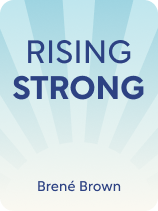
What are the best Rising Strong quotes by Brené Brown? What can these quotes teach you about emotional resilience?
According to her Rising Strong quotes, Brené Brown believes confronting your emotions and building resilience to trauma is key to a whole-hearted life. Emotional setbacks are bound to happen, so there’s no point in trying to ignore them.
Below are the best quotes from Rising Strong and the context behind them.
Brené Brown’s Quotes From Rising Strong
Brené Brown believes that the key to fulfillment is pursuing wholeheartedness—a way of life that fosters self-worth and emphasizes being brave, caring for yourself and others, and cultivating meaningful relationships. Living wholeheartedly requires you to embrace and express your authentic self. However, doing so makes you vulnerable—you may face painful experiences like rejection, loss, and heartbreak. If left unaddressed, these experiences cause emotional setbacks that can keep you from living wholeheartedly. In Rising Strong, Brown explains that to rebuild wholeheartedness after setbacks, you must recover emotionally.
Here are the three best Rising Strong quotes, Brené Brown’s meaning behind them, and how they can help you emotionally recover.
“Just because someone isn’t willing or able to love us, it doesn’t mean that we are unlovable.”
Brown says to record the initial narrative you’re telling yourself about the situation—what occurred, your beliefs about why it occurred, and what the situation made you think and feel. In doing so, be as truthful about your feelings as possible—you might feel crazy or unhinged if your story seems unreasonable, but that’s OK. For example, your story about your spouse missing your award ceremony might look something like this:
“My spouse missed my award ceremony because they’re selfish, and they didn’t want to go—being sick was just an excuse. Even if they were sick, they could have attended a short ceremony. If the roles were reversed, I would have pushed through for them. I must not be very important to them, and I must love them more than they love me.”
“The opposite of recognizing that we’re feeling something is denying our emotions. The opposite of being curious is disengaging. When we deny our stories and disengage from tough emotions, they don’t go away; instead, they own us, they define us. Our job is not to deny the story, but to defy the ending—to rise strong, recognize our story, and rumble with the truth until we get to a place where we think, Yes. This is what happened. This is my truth. And I will choose how this story ends.”
Brown argues that you must recognize when you’re having an emotional setback and explore your reaction. With practice, you’ll be able to recognize a setback as it happens; however, at first, you may need to reflect on the experience retrospectively.
To recognize the start of an emotional setback, Brown says you must first notice negative sensations in your body and your mind. When we experience painful situations, our bodies and minds usually react first. For example, you might feel physical sensations like pain in your chest; or, mental sensations like impulsive thoughts or the inability to control your thoughts. When you notice these sensations, acknowledge that you’re having an emotionally painful reaction to something.
For example, when you got the message that your spouse wouldn’t be at your award ceremony, you might have experienced a sinking feeling in your stomach or the urge to hit something. When you feel these sensations begin, acknowledge that something has hurt you and you’re having an emotional setback.
Next, Brown advises you to explore your reaction. What are you feeling? What caused this reaction? For example, the bodily sensations you felt after receiving the message from your spouse might indicate that you’re feeling angry and disappointed. Upon reflecting, you might realize you’re angry because your spouse’s lack of attendance makes you feel unimportant.
“It’s always helpful to remember that when perfectionism is driving, shame is riding shotgun.”
When we continually repress and ignore painful emotions, the accumulated hurt eventually causes our bodies to stop functioning properly. Brown explains that we become overwhelmed with anxiety and depression and can’t perform basic functions like eating, sleeping, and working.
For example, imagine you’re turned down for your dream job, your partner breaks up with you, and your friends are growing distant. These situations have all made you feel disappointed and unworthy, but rather than facing your feelings and identifying how you can handle them, you pretend you don’t care. The bottled-up emotions accumulate, causing your self-esteem to drop and depression to set in—you start to shut down. You stop caring about things that used to be important to you, like advancing your career, and you feel too dejected to perform basic tasks like eating healthy and socializing.

———End of Preview———
Like what you just read? Read the rest of the world's best book summary and analysis of Brené Brown's "Rising Strong" at Shortform.
Here's what you'll find in our full Rising Strong summary:
- How to rebuild wholeheartedness after setbacks and recover emotionally
- Why you shouldn't try to push through or ignore emotional pain
- Brené Brown's three-stage recovery process to cultivate resilience







I’ve read all of Brene Brown’s book. They change my life and in many ways set me free.